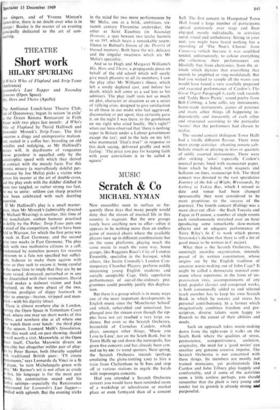THEATRE
Short work
HILARY SPURLING
Who's Who of Flapland and Strip-Tease Ambiance) Leonardo's Last Supper and Noonday Demons (Open Space)
HIS, Hers and Theirs (Apollo) The Ambiance Lunch-hour Theatre Club, late of Queensway, began its season in exile' at the Green Banana Restaurant in Frith Street with two plays last month: A Who's ho of Flapland by David Halliwell and Slawomir Mrozek's Strip-Tease. The first concerns a dingy and unimpressive malcon- tent, seated in a coffee bar, brooding on old ssindles and indulging, as Mr Halliwell's heroes will, in daydreams of vengeance chose grandeur is equalled only by the catastrophic speed with which they shrivel in contact with the measly facts. For this -hronic misery (a marvellously doleful per- rmance by Joe Melia) picks a victim who roves his master at the art of double-cross, d the play ends with the diddler diddled in nots too tangled, or rather strung too fast, or me to untie: seldom can sharp practice ave been celebrated with such dazzling xpertise.
If Mr Halliwell's play is a small master- iece, then Mr Mrozek's (admirably directed y Michael Wearing) is another, this time of at nonchalant, sunken humour practised deftly by the Poles: Strip-Tease puts one mind of the competition, said to have been eld in Warsaw, for which the first prize was week in .East Germany, and the second rize two weeks in East Germany. The play eals with two inoffensive citizens in a cell, • ndemned by nameless powers for reasons nknown to a fate not specified but suffici- fly hideous to make them squirm with rror as they seek to escane it, being careful t the same time to imply that they are by no eans vexed, dismayed, perturbed or in any ay dissatisfied with their tormentors. David eland makes a stalwart victim and Jack epherd, as the more abject of the two, rforms prodigies of slippy footwork in der to emerge—beaten, stripped and man- led—with his dignity intact.
There is almost nowhere else in London, ,rring the Open Space in Tottenham Court )ad, where one may see short works of this libre, and nowhere else at all where one y watch them over lunch: the third play the season, Leonard Melfi's Stimulation, pens this week and, on past showing, should well worth a visit. Meanwhile, at the Open race itself, Charles Marowitz directs an reeable but altogether milder pair of play- s by Peter Barnes. both liberally supplied ith traditional British gags: `I'll create onuments: says Leonardo da Vinci in a fit f pique, `to turn Michelangelo green with vY.' Mr Barnes's wit is not often as crude this, his language is for the most part rdY, his construction sound and his othic settings—especially the Renaissance kground for Leonardo's Last Supper— died with aplomb. But the evening sticks in the mind for two more performances by Mr Melia, one as a brisk, ambitious, six- teenth century Florentine undertaker, the other as Saint Eusebius (in Noonday Demons, a spat beween two tetchy hermits in AD 395, which bears a remarkable resem- blance to Bunuel's Simon of the Desert) of blessed memory. Both have the wit, delicacy and the singular sweetness which are Mr Melia's speciality.
And so to Hugh and Margaret Williams's His, Hers and Theirs, a propaganda piece on behalf of the old school which will surely give much pleasure to all its members; I saw the play after Mr Williams's illness, which left a sorely depleted cast, and before his death, which will come as a sad loss to his admirers. The play itself rests not so much on plot, character or situation as on a series of rallying cries, designed to give satisfaction to all those in our midst who feel aggrieved, disconsolate or put upon; they certainly gave it, on the night I was there, to the gentleman on my right who cried loudly, 'He's right!' when our hero observed that `there is nothing super in Britain under a Labour government except the tax'; and to the lady on my left who murmured 'That's true!' in response to this dark saying, delivered gruffly and with feeling: 'The price you pay for keeping faith with your convictions is to be called a square.'














































 Previous page
Previous page